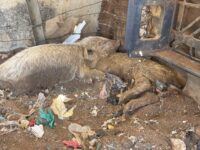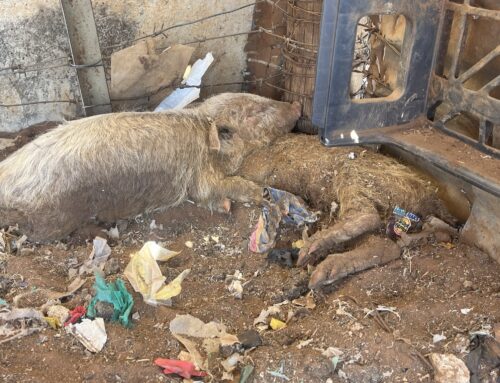It has been a long and trying year for the NSPCA as we continue to fight against a trade that is inherently cruel. We have lost battles and we have won – but the war is far from over.
The undeniable suffering that these animals experience during these journeys to the Middle East is both unnecessary and unacceptable.
Animals are essentially transported in vessels and remain in transit for up to 21 days, mostly stopping at more than one port. Traveling through immense heat, in a completely unnatural environment with inappropriate feed and often soiled water troughs, for those that are able to access them.
The vessel is not cleaned out for the entire journey so the sheep are forced to live in their own excrement, with inadequate ventilation that does little to cool the sheep, as the boiling hot air from outside the vessel is simply introduced in the vessel and re-circulated. The lights remain on for the entire journey and the noise levels are over 100 decibels (which is akin to a base drum) which means that the animals suffer stress due to the exhaustion of not being able to rest.
Gases such as ammonia, carbon dioxide and methane are common place due to the primitive nature of the exhaust on aged converted vessels, which according to insurance agencies are much older than other vessels in the global fleet. The off-gassing is exacerbated by the breakdown of hard faces when the vessels go through very humid locations in the ocean.
Disease is commonplace owing to the unhygienic environment, with re-circulated air spreading pathogens throughout the decks.
While the NSPCA does not accept the mortality percentage as an indicator of welfare, it is the most extreme indicator, nevertheless, on board veterinarians are unable to diagnose what animals died of onboard due to advanced autolysis (“rotten”). Continuing into 2020, this may be the most barbaric aspect. If the sheep were only discovered in this state, one has to wonder how long they were sick undetected for, dying a slow agonizing death.
These are just a few of the concerns involved in this type of transport, the animals endure a treacherous journey of cruelty only to be slaughtered without the protection they would receive in South Africa when they reach their final destination.
With your donation we are able to continue the fight against the live export of animals from our harbours across the equator! Together, lets stand against animal cruelty!
If you are as passionate about animals and their well-being as we are, consider supporting our causes by donating.
Latest News Posts
Will You Be the One Who Takes Action?
Most people will scroll past this. But will you be the one who stands up for animals?
Animal welfare isn’t always in the spotlight, but it changes lives – for every neglected, abused, or suffering animal we help. Our teams work tirelessly, often behind the scenes, ensuring animals across South Africa are protected.
This work is relentless. The challenges are immense. But with more hands, hearts, and resources, we can do even more.
The equation is simple: the more supporters we have, the greater our reach, the stronger our impact.
Be part of the change. Become an NSPCA Project Partner today. From just R50 per month, you can help ensure that no animal suffers in silence.








